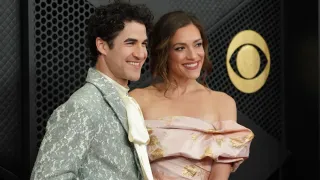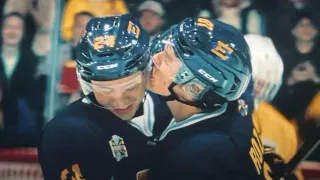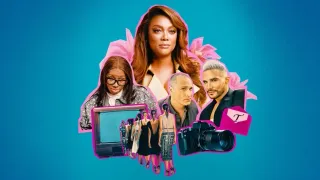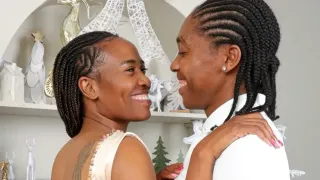August 21, 2024
Gonzo Journo William Keck Tells All (and Makes Amends) in Outrageous Memoir
Steve Duffy READ TIME: 14 MIN.
EDGE: Is there a star you regret stepping on?
William Keck: Absolutely, tons. I wrote about sending Emilie de Ravin from "Lost" running and crying from a round-table interview with several of her "Lost" co-stars while I worked for USA Today. I had to ask personal questions about their lives, and unfortunately, the week of this interview, Emilie split from her husband, so when I brought up that topic, she got really upset and just ran off in tears. Then, her castmates defended her and said it was inappropriate for me to ask personal questions. I felt terrible about that. Emilie apologized to me through her publicist, and we became friends. That's a big part of the book.
Over the years, I had an opportunity to do legitimate interviews. I received a second chance, and now many celebrities know me as a legitimate and respected journalist and TV producer. Several of them responded to my request to contribute essays from their perspective. Even though I crashed Melissa Gilbert's wedding back in the day, she writes a whole page in the book about the William she's come to know. Marcia Cross from "Desperate Housewives" was one of the first people I alerted about the book. I was sent to her home to interview and meet her new twin girls. The morning of the interview, the man I was seeing at the time texted me that a story had just broken from Perez Hilton about nude photos leaking of Marcia. So, here I was at her home, doing a fluffy little at-home piece, and in my mind I was thinking about whether or not I ask her about them. I decided to bring them up, which ended the whole interview. Marcia said, "Oh, Will, you're too hard on yourself." She absolved me, and she told her side of the story. She wasn't mad at me. She was mad at the photographer who took those invasive photos, and she had paid $10,000 to have those photos go away, and here they resurfaced.
For some of the celebrities I covered, I have received responses from their co-stars. Once, I upset Bruce Willis at a premiere, and he told me he would come burn my house down. I can't apologize to him because he's sadly nonverbal, but his "Moonlighting" co-star, Cybill Shepherd, spoke on his behalf, defended his sense of humor, and said that he most likely was not serious about burning my house down.
I have a very serious story in there about my very first story for the Enquirer, when I was sent to get a deathbed interview with Dack Rambo from "Dallas," who was dying of AIDS. I was sent with this hotshot new Enquirer hire and told do whatever he does. Well, Brad ended up inventing the whole deathbed interview. We never found him in his hospital bed, so Brad took me to a diner, and he made up a whole fake deathbed interview. That's been haunting me forever. It was a terrible thing, because here I was, a closeted gay guy, and I lusted after Dack Rambo when he was starring in "Dallas." It was just shocking how the Enquirer gets their stories. Sadly, I could not apologize to Dack or his immediate family because they have passed away. His "Dallas" co-star, Sheree J. Wilson, who played April Stevens Ewing, writes a lovely essay in the book about the Dack Rambo she knew and the legacy of a brave man who was one of the first to come forward with his diagnosis and helped change the perception of what AIDS was.
EDGE: Were there any celebrity threats that you took seriously?
William Keck: I had my crotch grabbed by one male celebrity in the book. He was a sitcom idol of mine, and I write about him. There was a time when celebrities thought they were above the law and could do anything. I think he thought I was getting a treat from him.
I did take these threats seriously. Kelsey Grammer, in his memoir, called me a despicable piece of flesh who he invited to fry in hell. He said, "Your mother must be very proud of you." And, in fact, my mother was very proud that Frasier was writing about me in his book. She got a big kick out of it. I shared the chapter with Kelsey, and he chose not to respond, but his ex-fiancé did, and wrote a personal essay where she revealed that their engagement ended with Kelsey having their therapist break up with her. He didn't even call to tell her himself, and then that led to her contemplating thoughts of suicide.
I received legal letters from Teri Hatcher and Victoria Principal. I write about how I stalked Victoria when I first came out to LA. I was so desperate to meet her that I booked an appointment to get a nose job from her plastic surgeon husband, Dr. Harry Glassman. I pass his office and see this framed photo of Victoria in a beautiful sterling silver frame. I was so excited that I ended up going through with the nose job. I did get to meet her, and became a little stalkery with her, which I write all about in the book. We haven't spoken since I got that legal letter, but when she found out about the book, she called me, and we had a lovely off-the-record conversation for about an hour. She elected not to write an essay in the book because she is very protective of her private life, but I feel like that conversation did help heal old wounds.
EDGE: Is this book a confessional and redemption for you?
William Keck: 100%! At the end of every chapter, I have a lesson learned. I believe that each of these mafia-like assignments I was sent out on helped me get a sense of who I was, what I was capable of, and what I was not willing to do. It helped give me a sense of right and wrong. I think that these lessons learned are just very funny, but others, I think, are relatable to others. I think the reader can apply it to their own lives with whatever moral quandaries they may be presented with. I was thrilled that I was absolved of my sins by many of these celebrities and their friends. The front of the book is loaded with quotes or support from many of my idols – Henry Winkler, Linda Evans, Donna Mills, Joan Collins, Lindsay Wagner, and many more. I crashed Lindsay's father's funeral back in the day, and here she's writing some lovely words about the power of forgiveness and second chances. I think that I was able to cleanse my soul and move forward with a clean conscience.
For more on "When You Step Upon a Star: Cringeworthy Confessions of a Tabloid Bad Boy," follow this link.






